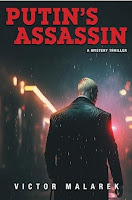by Andrey Kurkov
translated by Boris Dralyuk
published by HarperCollins Publishers
Copyright 2020 (Russian) English Translation 2024
288 pages
ISBN 978-0-06-335228-5
Summary by Kathy Hamara
About the Author:
Andrey Kurkov has been referred to as Ukraine’s most famous living author. He was born near Leningrad in 1961. His father was a pilot with the Soviet Air Force and when the unit was decommissioned, he moved his family to Kyiv where he found work at an aviation factory. Andrey was 1 or 2 years of age. Kurkov still lives in Kyiv. He holds a Ukrainian passport.
Kurkov studied at the Kyiv Institute of Foreign Languages, graduating in 1983. He speaks seven languages (Russian, Ukrainian, German, Japanese, English, Polish and French) and trained as a Japanese translator. He writes in Russian, his mother tongue, drawing the ire of some Ukrainian nationalists. He worked diverse jobs including journalist, prison warden, cameraman, screenwriter and writer of children’s stories before becoming a novelist and self-publishing.
Kurkov’s writing features satirical portrayals of post-Soviet life, corruption and the complexities of Ukrainian identity and society. He is a prominent commentator and journalist, democracy advocate and critic of Putin. He is on the Kremlin list of Ukrainian activists. He has at least 19 books to his name. The Silver Bone was longlisted for the International Booker Prize in 2024.
Notable Works:
2001 - Death and the Penguin
2003 - Jimi Hendrix Live in Lviv
2014 - Ukraine Diaries: Dispatches from Kyiv
2016 – The Bickford Fuse
2020 - Grey Bees
2022 - Diary of an Invasion
2025 – The Stolen Heart, Book 2 of the Kyiv Mysteries (Samson Kolechko must rescue his kidnapped fiancée while investigating the illegal sale of meat in the lawless 1920’s Kyiv. Based on a real-life case.)
In his novels, much has been drawn from Bolshevik secret police files from WWI which were passed along to him by a reader. His novels have been translated into 41 languages.
About the Translator Boris Dralyuk
Boris Dralyuk was born in 1983 in Odesa. He left Odesa at the age of 8 but has maintained close ties. He is a Ukrainian-American writer, editor, translator and university professor of Russian literature who holds a PhD in Slavic Languages and Literature from UCLA. He published a poetry collection in 2022 – My Hollywood and Other Poems and has translated at least 18 books including a Ukrainian children’s story Who Will Make the Snow? which was included in the New York Times list of best children’s books of 2023.
Synopsis
The Silver Bone is a historical mystery novel set in the chaotic Kyiv of 1919 following WWI and the Russian Revolution. The city is controlled by the Red Army and beleaguered by different factions vying for control of Ukraine. The opening scene is dramatic and bloody as Samson Kolechko’s father is murdered by Soviet Cossacks in front of him. Samson’s ear is sliced off by a sabre, though he manages to retrieve it and store it in a tin box in his father’s desk. He is now a young, orphaned, unemployed electrical engineer living alone until rooms and furniture in his flat are requisitioned and two Red Army soldiers move in. He soon discovers the magical properties of his severed ear: he can hear everything through it, even at a distance.
When his father’s desk is mistakenly requisitioned, Samson heads to the police station to reclaim it, only to be hired as an investigator by the supervisor who admires his superior writing skills. His first case is focused on the investigation of the two soldiers in his flat who have amassed bags of stolen goods.
The yard sweeper’s widow in the flat below serves as matchmaker and introduces Samson to Nadezhda who is a single statistician drawing up the city census. She becomes a love interest and assists Samson in solving cases. He follows a trail that eventually leads to the discovery of a theft of silver objects including a silver femur replica and a man’s suit of unusual proportions. He eventually solves the murder of a soldier and a tailor.
Kurkov deepens his story with a vivid portrait of Kyiv that emphasizes the city’s atmosphere of fear, danger and considerable material deprivation including food, firewood, electricity and water. The Silver Bone is at once dark, comical, ironic and absurd with an affable protagonist, finely drawn characters and descriptions of daily life in Kyiv 1919 and the endurance of the human spirit.
Kurkov/Dralyuk Interviews and Articles
https://www.nytimes.com/2022/05/24/magazine/ukraine-andrey-kurkov.html
https://www.guernicamag.com/andrey-kurkov-the-border-between-real-and-surreal-lies-somewhere-else/


